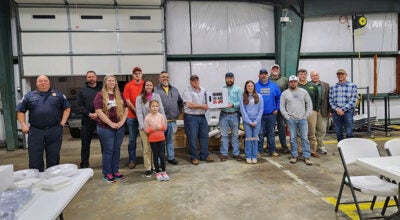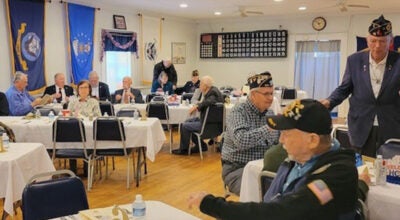Town Council discusses abandoned church
Published 9:24 pm Monday, August 26, 2019

- This building was once known as Macedonia Church of God in Christ, but has reportedly been abandoned since at least April 2016. The Town of Windsor Planning and Zoning Administrator Ben Sullivan reports that site's front and side yards have become a dumping ground for refuse — such as pedal boats, discarded bicycles and vehicles in various states of operational condition — and that two residents have claimed the site has become a breeding ground for snakes.
|
Getting your Trinity Audio player ready...
|
WINDSOR
The Town of Windsor is looking into what, if anything, can be done about a dilapidated, abandoned church on Maple Lane.
According to an Aug. 8 report from the town’s planning and zoning administrator, Ben Sullivan, the town has received numerous complaints from residents regarding the structure, which was once known as Macedonia Church of God in Christ, but has reportedly been abandoned since at least April 2016. Sullivan’s report alleges that the site’s front and side yards have become a dumping ground for refuse — such as pedal boats, discarded bicycles and vehicles in various states of operational condition — and that two residents have claimed the site has become a breeding ground for snakes.
According to Sullivan, section 51-1 of the Town Code allows Windsor’s Town Council to determine if the property has become a “hazard or menace from any standpoint” and if deemed as such, to remove or repair the structure. Deeming the structure as a “hazard or menace,” according to the Town Code, can be accomplished via a majority vote of the Town Council.
However, section 15.2-906 of the Code of Virginia requires that a structure “might endanger the public health or safety of other residents of such locality” before a municipality can make changes to a structure without the owner’s approval.
Of the two residents who told the town that snakes had taken up residence on the property, one, according to Sullivan, claimed the snakes were copperheads, which are venomous. His report states that the Isle of Wight County Sheriff’s Office’s Animal Control division was notified of the potential snake infestation on Aug. 6.
Lt. Tommy Potter, spokesman for the Isle of Wight County Sheriff’s Office, said that the Sheriff’s Office did not have any record of Animal Control responding to that location.
“It doesn’t mean they didn’t go out there, but what it does mean is that no action was taken by Animal Control, since a report wasn’t filed,” Potter said.
When asked if the presence of copperheads, if confirmed, would qualify the site under Virginia Code 15.2-906 as a danger to public health and safety, Town Manager Michael Stallings said Sullivan or a building inspections official would be the one to make that judgement call.
Sullivan told Windsor’s Town Council on Aug. 13 that, in his opinion, “at this point, as long as you don’t go into the building, it’s not a public health issue.”
His report did, however, claim that Isle of Wight County building inspectors are aware of the situation and have deemed the structure “unsafe” as defined in the Virginia Maintenance Code. This is defined as “an existing structure (i) determined by the code official to be dangerous to the health, safety and welfare of the occupants of the structure or the public (ii) that contains unsafe equipment, or (iii) that is so damaged, decayed, dilapidated, structurally unsafe or of such faulty construction or unstable foundation that partial or complete collapse is likely.” The code adds that a vacant existing structure that is unsecured or open shall also be deemed an unsafe structure.
Isle of Wight County’s municipal code states that the county’s Board of Supervisors, through its own agents or employees, may remove, repair or secure any structure that “might endanger the public health or safety of other residents of the county” in the event that the owner or owners of said property — after being notified and provided with a reasonable time to remedy the situation — fail to remove, repair or secure the structure. The county code also states that the cost the county incurs in removing or securing the structure will be charged to the owners of the property via taxes and levies.
The difficulty in enforcing either the town’s or the county’s ordinances, according to Sullivan, lies with each locality’s inability to locate and contact the current owners of the abandoned church.
“The closest we have right now to anyone associated with the property was someone who paid the water bill about three years ago,” he said.
Stallings added that there is no water bill for the property currently.
Sullivan’s report further alleges that “Mark Drumheller, the [county’s] chief codes compliance inspector, has said that the county is unable to enforce the ordinance unless they can contact the property owner” and that Drumheller had “suggested that the town ordinance would be the best tool to handle the abandoned property.”
The report also claimed that there “seemed to be an unwillingness” on the part of the county to push the issue “since it would constitute a taking of the property, a situation the county lawyer is said to not want to encourage.”
Windsor Weekly attempted to contact Drumheller on Monday in an effort to verify the statements he is alleged to have made with regards to the Maple Lane property, but did not hear back by press time on Friday. The newspaper also reached out to County Attorney Bobby Jones Jr. in an effort to verify whether he and/or the county were indeed reluctant to take action on the abandoned property. Jones, however, claimed on Monday afternoon that he was not familiar with the property at 102 Maple Lane, and denied having spoken to Windsor’s planning and zoning director.
Sullivan confirmed he had not spoken with Jones, and said the statement in his report regarding the county’s “unwillingness” to push the issue had come from Drumheller.
Stallings confirmed that were the Town Council able to legally take action to raze the structure, it would have to contract the demolition to a third party, as the town government does not have the necessary equipment and personnel to do the work on its own. The cost of the demolition, according to Town Attorney Fred Taylor, would need to come out of the town’s budget. The attorney explained that the town could theoretically place a lien on the property in the amount of whatever it cost to tear down the structure, but as long as the property maintains its tax-exempt status as a church, the town would be “placing a lien on something that’s never going to happen.”
“We are exploring whether the county can rescind [the church’s] tax exemption, since it’s not an active church,” Taylor said. “My interpretation is if it’s not being actively used for a civic/religious purpose, it should not be tax-exempt.”




